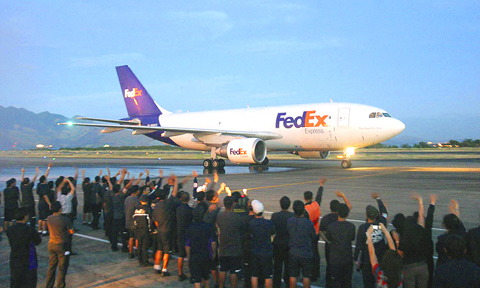FedEx began winding down its Asian hub in the Philippines and shedding 800 staff yesterday as the US courier giant started full operation of a new regional facility in China, an official said.
Arman Areza, administrator of the Subic Bay economic and tourism zone where FedEx has been based for nearly 14 years, said the company would for now keep a skeleton operation in Subic as a back up to the US$150 million hub in Guangzhou, China.
FedEx has said the Subic facility may finally close in April after which it has the option to renew its lease on a monthly basis, he said.

PHOTO: AP
The closure of FedEx’s operation comes in the wake of an announcement by Intel Corp last month that it will let go 1,800 workers later this year when the company shuts down its 35-year-old operation in the Philippines amid waning global demand for computers.
Areza said the decision to shift the hub to China was made in 2005 and was based on “market reality” — the large cargo volume in China — not on Subic being unable to meet the requirements of FedEx or the current global slump.
“The move has nothing to do with the financial crisis,” Areza said.
“The volume and market conditions favored China because the volume in China dwarfed those in Southeast Asia, and China has opened the domestic market to FedEx,” he said.
Subic, 80km west of Manila, was converted from a sprawling US naval base into an economic zone after US forces left in 1992.
The Philippine government will lose between 150 million pesos and 160 million pesos (US$3.15 million to US$3.37 million) annually in landing, parking and warehousing fees it has been collecting from FedEx since it started operating the Subic hub in September 1995, Areza said.
He said about 800 workers of FedEx and its subcontractors would be affected, but added that he expected the highly skilled workers could easily find jobs elsewhere in the economic zone.
Dozens of workers showed up before dawn yesterday at the former hub to wave goodbye to one of the last FedEx planes to fly out of Subic.
“Even if the economy is doing well ... it’s never a good time if a company as big as FedEx [leaves]. We are sorry to see them go,” Areza said.
FedEx officials were not immediately available for comment.

In his National Day Rally speech on Sunday, Singaporean Prime Minister Lawrence Wong (黃循財) quoted the Taiwanese song One Small Umbrella (一支小雨傘) to describe his nation’s situation. Wong’s use of such a song shows Singapore’s familiarity with Taiwan’s culture and is a perfect reflection of exchanges between the two nations, Representative to Singapore Tung Chen-yuan (童振源) said yesterday in a post on Facebook. Wong quoted the song, saying: “As the rain gets heavier, I will take care of you, and you,” in Mandarin, using it as a metaphor for Singaporeans coming together to face challenges. Other Singaporean politicians have also used Taiwanese songs

NORTHERN STRIKE: Taiwanese military personnel have been training ‘in strategic and tactical battle operations’ in Michigan, a former US diplomat said More than 500 Taiwanese troops participated in this year’s Northern Strike military exercise held at Lake Michigan by the US, a Pentagon-run news outlet reported yesterday. The Michigan National Guard-sponsored drill involved 7,500 military personnel from 36 nations and territories around the world, the Stars and Stripes said. This year’s edition of Northern Strike, which concluded on Sunday, simulated a war in the Indo-Pacific region in a departure from its traditional European focus, it said. The change indicated a greater shift in the US armed forces’ attention to a potential conflict in Asia, it added. Citing a briefing by a Michigan National Guard senior

CHIPMAKING INVESTMENT: J.W. Kuo told legislators that Department of Investment Review approval would be needed were Washington to seek a TSMC board seat Minister of Economic Affairs J.W. Kuo (郭智輝) yesterday said he received information about a possible US government investment in Taiwan Semiconductor Manufacturing Co (TSMC, 台積電) and an assessment of the possible effect on the firm requires further discussion. If the US were to invest in TSMC, the plan would need to be reviewed by the Department of Investment Review, Kuo told reporters ahead of a hearing of the legislature’s Economics Committee. Kuo’s remarks came after US Secretary of Commerce Howard Lutnick on Tuesday said that the US government is looking into the federal government taking equity stakes in computer chip manufacturers that

CLAMPING DOWN: At the preliminary stage on Jan. 1 next year, only core personnel of the military, the civil service and public schools would be subject to inspections Regular checks are to be conducted from next year to clamp down on military personnel, civil servants and public-school teachers with Chinese citizenship or Chinese household registration, the Mainland Affairs Council (MAC) said yesterday. Article 9-1 of the Act Governing Relations Between the People of the Taiwan Area and the Mainland Area (臺灣地區與大陸地區人民關係條例) stipulates that Taiwanese who obtain Chinese household registration or a Chinese passport would be deprived of their Taiwanese citizenship and lose their right to work in the military, public service or public schools, it said. To identify and prevent the illegal employment of holders of Chinese ID cards or